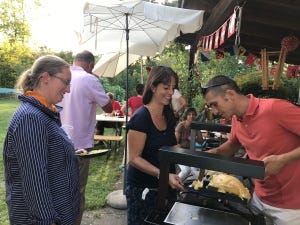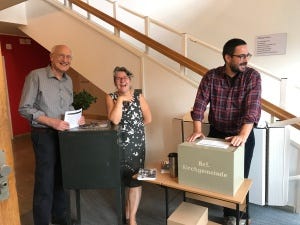On becoming Swiss, the rest of the story
You asked for it, so I've cleaned out the archives at the end of the year
It is all true: In Switzerland one’s neighbors vote on whom to accept as fellow citizens.
Originally published in June 2017
At the June 8 (2017) town meeting held in the multi-purpose sport hall, 110 qualified voters (out of 4,169) turned up on a warm summer evening to decide our fate.
We’re especially pleased to have helped get out the youth vote: two of those present had recently turned 18, so were voting for the very first time. That’s almost 2% of the vote! So much for apathetic youth! 1
After the protocol from December’s meeting, and the auditor’s report on the 2016 budget were approved, we all received a detailed slide show on what happened (down to the last franc) with the loans approved for building a new relay station, laying new cables and resurfacing several streets. I am really starting to feel the burden of information and responsibility about to be conferred upon us. Being an active citizen in Switzerland’s direct democracy is a lot of work.
Finally, agenda point five: We are introduced individually and asked to stand. My son smiled and waved at the audience, which won points for sheer cuteness. Then all nine candidates were escorted from the room. Since we could still hear the proceedings from the lobby, we were herded into what my son delightedly informed us was the teachers’ locker room.
Before our little Croatian-Kosovaran-Spanish-American-German group could get over the indignity, we were summoned back into the auditorium. To applause. And members of the town council shaking our hands and handing each of us a set of flags (national, cantonal, municipal). It was rather touching, actually.
After a couple more agenda points, and the usual suspects stepping up to the microphone with some of the usual questions, the meeting was adjourned for the apéro. Which anyone who has spent any time in Switzerland knows is an unassailable part of the culture, and transcends the language regions. Local wine and Speckzopf (savory bread with bacon) was served by members of the town’s small animal breeders’ club.
And now that we’re in? Well, we are so far merely citizens of our village. This automatically confers cantonal as well as federal citizenship, but we have to wait for our papers to clank through the machinery before we can get our red passports. This can take from two months to two years.
Happy New Year 2018
Originally published in January 2018
Over the holidays, we received a letter from our canton’s interior ministry confirming their receipt of our application for citizenship. I almost forgot! In case any of my five readers have also forgotten, the action left off when we were granted the “assurance of local citizenship” back in June 2017, voted on by our fellow (can say that now) Würenloser. We are not sure why it took our town’s administration six months to forward the dossier to the cantonal authorities, or why it took the canton six months to acknowledge receipt.
What we do know, however, is the approximate timetable for the rest of the process. The canton has to examine our case, then obtain federal permission to put the matter before the cantonal parliament. The 140-member legislature will then vote and we will be informed about its decision in writing. This will take about 10 months, the letter informs us.
Before this ponderous stone can be set into motion, we must do two things: pay the cantonal and federal administrative fees (2,025 Swiss francs), and provide a current (i.e. not older than 14 days) Betreibungsregisterauszug for all applicants over 18.
This wonderful word describes a document peculiar to Switzerland which is required for almost any transaction. It is similar to a credit report, in that it states whether you have any unpaid bills. One obtains this at the local Betreibungsamt for a small administrative fee (17 francs per). The clerk consults the federal computerized registry and prints out a document that either lists one’s financial transgressions or certifies there are none.
The nasty thing about this system is that anyone can file a claim against anyone. Like if my neighbor decides I owe him 100 francs because he watered my garden while I was on vacation. Which I never promised. Now he can file a claim against me at the Betreibungsamt. No legal claim is required, and the debt (and its validity) are settled later during the proceedings. Until then, you have a black mark in your registry.
This process is entirely separate from insolvency or bankruptcy, although proceedings against a legal entity can result in a bankruptcy being declared. On the personal level, you may have possessions confiscated or part of your wages seized to meet the demands against you.
According to the Swiss Federal Statistics Office, the number of Betreibungen hit a record high in 2016, with 2,938,650 registered cases. With a population of 8.372 million, that’s a lot of financial bickering going on.
We’re clean, though. And what my spouse found amusing is the “hurry up and wait” nature of the request for documentation: we had to return a fresh Betreibungsregisterauszug (because who knows what sins we might have amassed since the last one we filed nine months ago!) within 10 days, or the entire process would have been stopped.
Last box ticked; now we wait.
Members of the Cooperative Society of the Oath
Originally published in July 2018
A couple weeks ago we got a letter from our canton. It even sat in the pile of mail to be opened for a few days because we were busy, the school year was drawing to a close, it was hot, and was probably just something about taxes that no one felt responsible for at that moment.
It turned out to be a letter informing us that the cantonal legislature (Grosser Rat) had approved our application for citizenship, and the federal interior ministry had agreed with our village and canton. Welcome to the Eidgenossenschaft!
Don’t bother trying to translate this mouthful. It’s a seemingly German word only used in Switzerland. Literally, the cooperative society of the oath. This refers to the founding of the confederation on the mountain plateau at Rütli which is commemorated every August 1.
In fact, we’ve been Eidgenossen since June 5, 2018, but the canton sent the letter with B-post. We have two classes of mail here, A-post (domestic mail guaranteed to arrive the next day) and B-post (not, but costs 15 cents less). As a taxpayer, I am proud of my canton for showing me it is saving money. But: really?
The letter itself was a charming mixture of congratulatory what-passes-for-emotion, official-ese, and valuable information about what happens next. Like: don’t run to your village clerk to apply for a passport just yet, since it takes about a month for all the documents to filter back to the permanent databases where they belong. Considering that my village took half a year to send the stuff up to Aarau in the first place, this is not encouraging.
Just as I had settled down to wait, a letter arrived from the village (which I opened promptly) to tell us to go online to submit our passport applications. Already?
So I did and we got appointments at the cantonal office for passports and identity cards in Aarau (half an hour’s drive, 20 minutes with the train) on Monday. We could have gone to have our biometric data recorded even sooner, but boy has been at scout camp.
The letter also contained a document2 informing us that a Heimatschein for each of us was deposited at the registry in Würenlos. This is an essential document for a Swiss person. It officially states that Würenlos is our Heimatort, forever. Now we are officially from here, and that will be noted in all our Swiss documentation (our passports, IDs and other legal documents) from now on. If we move to another town in Switzerland, we have to deposit our Heimatschein at the civil registry of that community.
Until 2012, the Heimatort was the place that had to take you in if you had nowhere else to go: t was the town on your Heimatschein that had to pay your social benefits if you had fallen through all the (numerous) social safety nets.
While non-Swiss documents generally list one’s place of birth, the Swiss ones don’t. My new passport and identity card will not state that I was born in Chicago USA. Only my Heimatort: Würenlos. Which is odd. It’s as if I didn’t exist before. Würenlos as the place of my re-birth as a Swiss person?
That was the year that was
Originally published in December 2018
We’ve been in a whirl since July.
Frankly, I’m still reeling from the fact that we went to the biometric data center in Aarau on a Monday, got pictures taken, irises and fingerprints scanned, and then ON WEDNESDAY we received our red passports and national ID cards. Clearly A-post was in use.
And there were some emotional moments of transition, like when I had to surrender my Ausländerausweis (foreigner’s ID card). Forever. I took it to the town clerk, it was recorded and destroyed.
We celebrated with a “red and white” party, complete with a Swiss trivia test; name-the-canton flags; Swiss wine, beer, and fresh apple cider from a local farmer; and huge blocks of cheese.
We borrowed industrial-strength raclette ovens from Sepp the Cheese Guy and a spent a sunny summer afternoon with friends and neighbors in the garden, melting cheese. Our guests were a good mix of foreigners, dual citizens, and Swiss persons. We have arrived.
Then there’s voting.
I’ve been voting a lot since becoming a card-carrying Eidgenossin. In the last half year, there have been two referendum weekends and one town meeting. Each of these occasions requires a great deal of reading beforehand; we get comprehensive pamphlets mailed to us at home, along with the personalized ballot paper.
It’s a fair amount of work to keep up with the issues at hand, and form an intelligent opinion at the right time. It’s no wonder that voter participation in Switzerland is, well, modest. According to the Federal Office of Statistics, 43.7% of eligible voters did their duty in 2018. This is the average from four separate polling days, which covered a total of 10 different proposals. Note that’s ten at the federal level: Your mileage may vary, depending on which canton you live in and whether you have any local referenda.
The voter receives a lot of help to figure it out.
For example, here’s what we voted on in September. At the federal level, federal authorities won the right to coordinate bicycle routes across Switzerland (as is already done for hiking routes). Voters rejected a proposal to create more rules for food producers in Switzerland regarding sustainability, and to require imported food to meet the same standards. Fortunately, a proposal to give Swiss agriculture priority by raising tariffs on certain products (against existing trade agreements) was also rejected. In our canton, voters also rejected a proposal to more than double the tax rates for high earners.3
In November, voters rejected both an initiative to raise subsidies for farmers who leave the horns on their cows and goats4, plus a bizarre nationalist proposal to give Swiss law precedence over international law. However, a measure to allow social insurance detectives to investigate people receiving benefits was passed. At the cantonal level, voters rejected a measure that would require the canton to pay private forest owners for taking care of their woods, and narrowly passed a change to our canton’s constitution that will allow Swiss citizens living abroad to be allowed to vote for the representatives of the canton in the upper house of parliament.5
And in our town meeting in December, we approved next year’s budget, accepted new statutes regarding child care outside the family, and voted in a bunch of new citizens. I made my debut at the microphone by telling a member of the nationalist right Swiss People’s Party that his counterproposal for changing the subsidy scale for child care was ridiculous, then prodded the town council to create a committee to explore all-day child care and enrichment programs in cooperation with the school.
I’ve been waiting long enough to make some noise. However, this is unusual behavior for the “nouveau Suisse”, it seems. At the requisite apéro after the town meeting, my wine glass was frequently refilled by town councilors and fellow villagers as discussion continued. 2019 here we come.
One was our neighbor’s son, and the other a leader from my son’s scout troop. Love these small towns.
and, of course, a bill: CHF 64.50
Colloquially known as “the millionaire’s tax”, though it would have kicked in well under that amount.
Here’s a cool video explaining the horned cow issue from the federal government, in German.
This could come in handy for us later. Because who wants to live in Disneyland forever?












Interesting. I am working on writing my own article on the decline of Christian Democracy in Europe with a particular focus on Germany(as the "last" country where Christian Democrats are a major political force). Something I keep coming back to is I feel for that all of Switzerland's small c Conservative nature a real socially conservative oriented CDU/CSU type politics that is strongly against sex/prostitution/pornography, hard drug de-criminalization(The Swiss have some of the highest cocaine usage in the world), and assisted dying as practiced by someone like Dorothee Bar of the CSU would be very unwelcome in Switzerland. Is this because there is balance in CH between social liberalism and economic conservativism that economic conservatives don't want to change or is Switzerland so back in time one might call it explicitly anti feminist or at least anti first wave feminism where the government just wants women to do what their told and shut up about the anti feminist aspects of prostitution, pornography, drug use, etc. Hope you might have some insight.
What is ironic is for those in Germany who wish to return to an old 1980s Helmut Kohl pre unification West German style of politics Switzerland is the de-facto model. The Swiss National Bank during Covid was this all powerful inflation fighting machine just like the old Bundesbank. Swiss and West German living standards used to be comparable but now the Swiss are much richer(and have kept pace with the US). Just like Kohl era West Germany the SVP talks about both sides of its mouth on immigration i.e. talks tough against immigrants but makes sure the business community gets all the guest workers and work permits they need(just like Helmut used to do). The difference being that in a strong economy like Switzerland of today and Kohl era West Germany no one really cares as long as the good times roll but in a bad economy like today's Germany people get really mad.
Still there is something that prevents the CDU/CSU for wanting Switzerland as a model. Is it the social liberalism or the immigration hypocrisy of present-day CH(that the Adenauer and Kohl CDU used to know how to practice quite well)? Anyways thought maybe you or your German husband might have some thoughts? Also, Switzerland is part of Schengen like Germany but doesn't seem to have all these stabbings and people driving cars into Christmas markets. Are German police just incompetent compared to Swiss police?
PS. Is it true the leader of the AfD actually lives in Switzerland.?
I've been lurking but I wanted to thank you for sharing your archives on your journey to citizenship (not even going to try to use the Swiss terms!) As someone who's about 3.5 years out from being eligible to apply for Portuguese dual citizenship, I'm super impressed with how fast you and your family were able to get your new passports - after the initial monthslong delay with your local paperwork, a speedy passport process seems only fair!